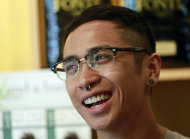“I don’t even know what I’m looking for,” says Michael Bledsoe, who described months of fruitless job searches as he served customers at a Seattle coffeehouse. The 23-year-old graduated in 2010 with a creative writing degree.

In this photo taken Thursday, April 19, 2012, barista Michael Bledsoe smiles as he chats with a visitor in the coffee shop where he works in Seattle. The college class of 2012 is in for a rude welcome to the world of work. A weak labor market already has left half of young college grads either jobless or underemployed in positions that don’t fully use their skills and knowledge.
The college class of 2012 is in for a rude welcome to the world of work.
A weak labor market already has left half of young college graduates either jobless or underemployed in positions that don’t fully use their skills and knowledge.
Young adults with bachelor’s degrees are increasingly scraping by in lower-wage jobs — waiter or waitress, bartender, retail clerk or receptionist, for example — and that’s confounding their hopes a degree would pay off despite higher tuition and mounting student loans.
An analysis of government data conducted for The Associated Press lays bare the highly uneven prospects for holders of bachelor’s degrees.
Opportunities for college graduates vary widely.
While there’s strong demand in science, education and health fields, arts and humanities flounder. Median wages for those with bachelor’s degrees are down from 2000, hit by technological changes that are eliminating midlevel jobs such as bank tellers. Most future job openings are projected to be in lower-skilled positions such as home health aides, who can provide personalized attention as the U.S. population ages.
Taking underemployment into consideration, the job prospects for bachelor’s degree holders fell last year to the lowest level in more than a decade.
[…]















